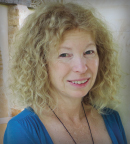I have always been interested in volunteering my services and helping others, so when I got an e-mail asking if I’d like to participate in the WISDOM (Women Informed to Screen Depending on Measures of Risk) study (www.thewisdomstudy.org) I signed on. The study plans to enroll 100,000 diverse women from across the United States to help build a personalized way to screen and treat breast cancer. I was excited to join the group and contribute to this important research.
After I completed the health questionnaire and was accepted into the study, I provided a saliva sample to identify my risk factors for breast cancer. Then I waited for my personalized breast cancer screening plan.

We don’t get to decide how long we are going to live. But how well we live that life is up to us.— Sally Luckett
Tweet this quote
Coming to Terms With Genetic Cancer Risk
I have been fortunate to have had good health all my life. I’ve never been on prescription medication, I go to the gym every day, and I eat a healthy diet. My mother lived until she was 90, and, as far as I know, there is no history of cancer in my family. So, it was especially shocking to get a phone call from a study breast cancer specialist a few days after I submitted my genetic material telling me I had tested positive for the BRCA gene mutation, was at high risk for developing breast and uterine cancers, and would need immediate prophylactic surgery to remove my uterus and breasts.
Still reeling from the news, I met with a surgical oncologist who agreed I should have a hysterectomy and possibly a mastectomy as soon as possible.
My experience with hospitals had been limited to the occasional trip to visit sick friends and family members. Within a week, I had gone from being in robust health to being admitted to a hospital for a hysterectomy. I was terrified. The good news was there were no signs of cancer in my uterus and cervix, but my relief was short-lived.
Next, I had to undergo several tests in search of breast cancer, including a three-dimensional tomosynthesis mammogram and an ultrasound. The tests found a small mass in my right breast. Although my surgical oncologist has put me on a 6-month watch-and-wait schedule to see whether the tumor grows, eliminating the need for an immediate mastectomy, I have been on an emotional roller-coaster.
Living Free of Guilt
Despite the anxiety I have since the discovery of the BRCA gene, I’m grateful that I volunteered for the WISDOM study and learned about my high risk for developing these life-threatening cancers. Before I joined the study, I had never heard of the BRCA gene mutation and the potential danger it poses. Although the experience has been unsettling and scary, having this knowledge has also been empowering.
I had always taken for granted that being physically active, eating well, and maintaining a healthy lifestyle would bullet-proof me from serious illness. I now know that while taking good care of your health is, of course, important, it doesn’t guarantee you can escape serious diseases like cancer. Learning that I have this gene mutation woke me up to the fact that life can turn on a dime, and you can’t take anything for granted.
I have always thought life was a gift, and this experience has reinforced that feeling. Although I’m still obsessive about maintaining a healthy lifestyle, I’ve taken the pressure off myself. If I can’t make it to the gym every day, I don’t feel guilty, and try to keep life in better perspective.
We don’t get to decide how long we are going to live. But how well we live that life is up to us.
Ms. Luckett lives in Nashville, Tennessee.
Editor’s Note: Columns in the Patient’s Corner are based solely on information The ASCO Post received from patients and should be considered anecdotal.

